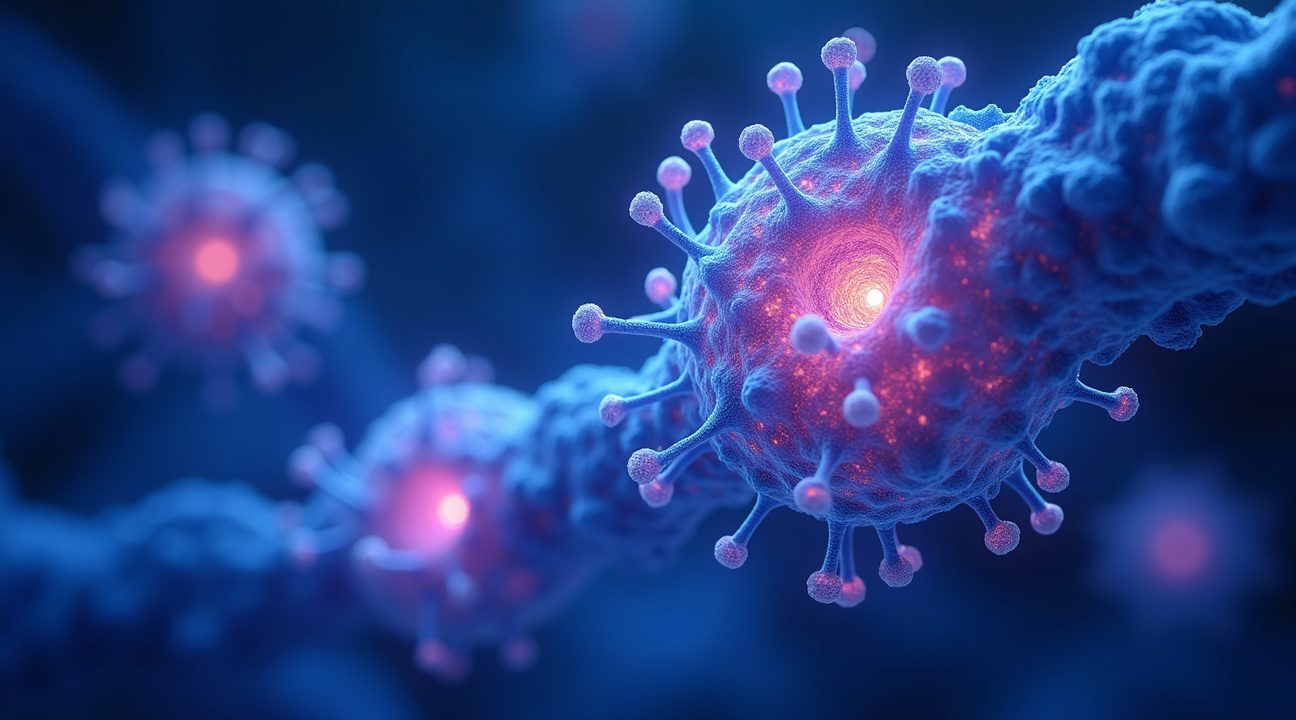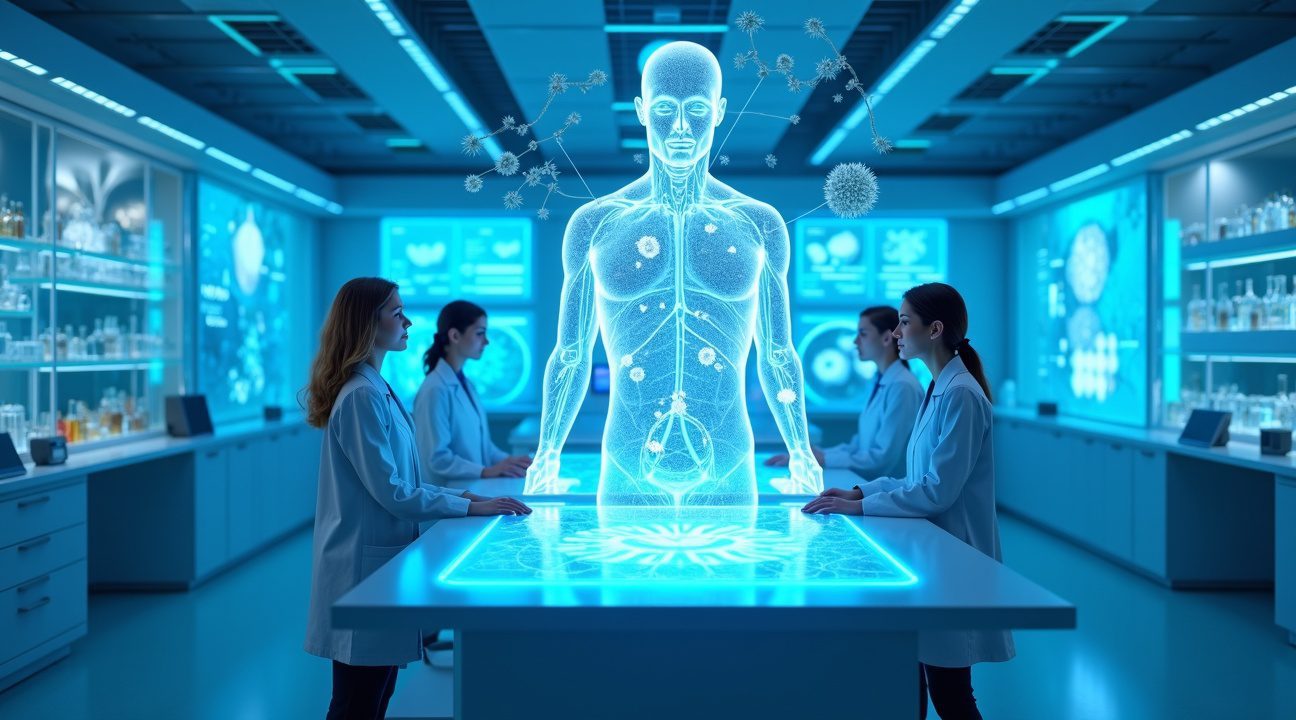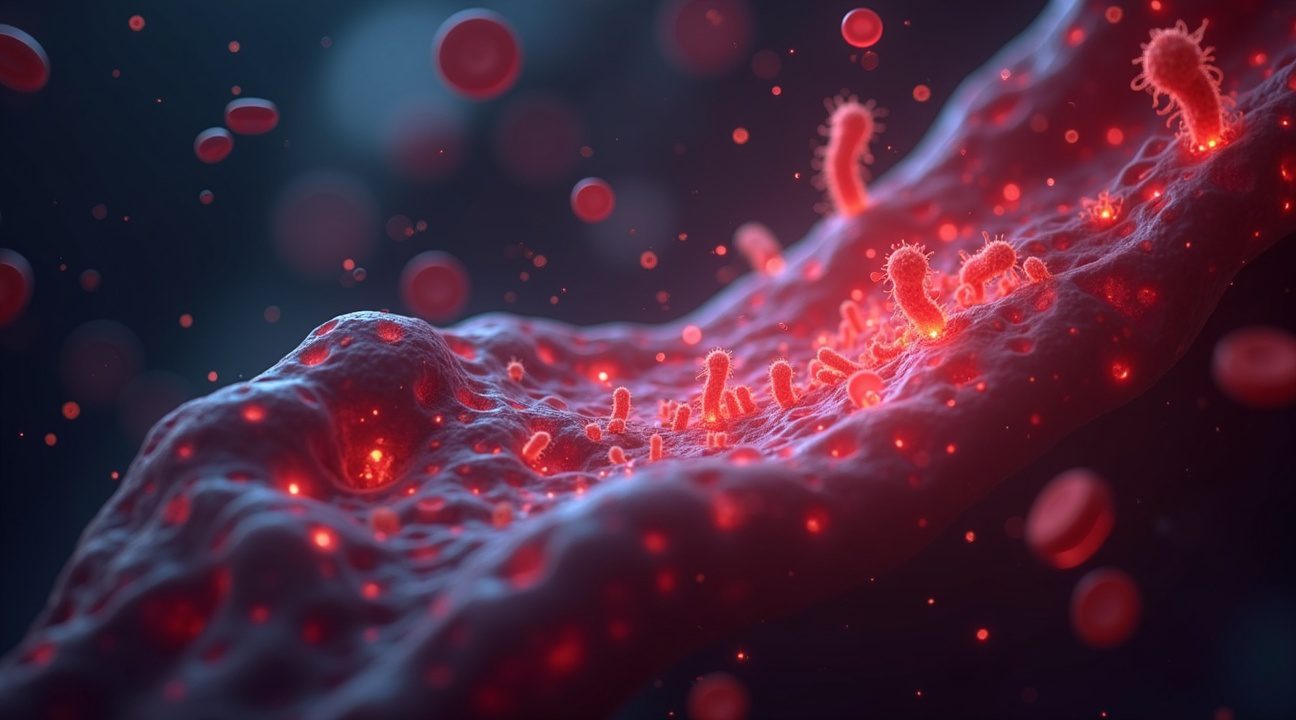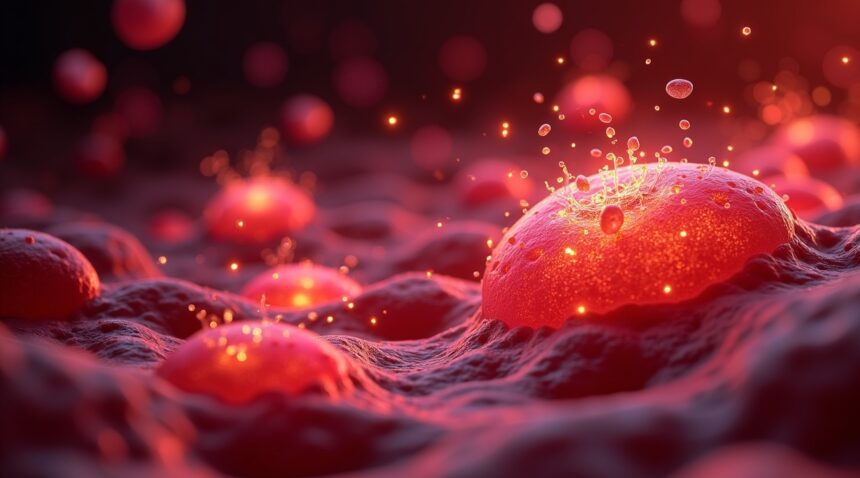Scientists have discovered twelve indole metabolites produced by Paracoccus sanguinis, a naturally occurring blood bacterium, with six of them being entirely new to science and some showing remarkable anti-aging potential.
Key Takeaways
- Blood bacterium Paracoccus sanguinis produces novel anti-aging compounds that intervene by targeting oxidative stress, reducing inflammation, and preserving collagen all at once.
- Metabolite 11 demonstrated the most effectiveness, with superior anti-inflammatory action and heightened protection against collagen degradation when compared to the other identified metabolites.
- This discovery reshapes traditional views of sterile blood circulation by highlighting the positive role of symbiotic bacteria in human health and longevity.
- Unlike conventional anti-aging methods, these compounds operate internally by modifying cellular processes, offering a more foundational approach to anti-aging therapy.
- Clinical studies are essential to determine appropriate safety measures and dosage strategies before transitioning these findings into practical human anti-aging treatments.
Blood Bacteria Produces Powerful Anti-Aging Metabolites That Combat Cellular Damage
Scientists have made a groundbreaking discovery that could reshape our understanding of aging prevention. I’ve been following research into a specific bacterium called Paracoccus sanguinis that lives in human blood, and the findings are remarkable. This microorganism produces unique anti-aging compounds that demonstrate powerful effects against cellular damage associated with aging.
Researchers identified twelve distinct indole metabolites produced by this blood bacterium, with six being completely new to science. The discovery process involved extensive laboratory analysis to characterize these compounds and test their biological activity. Through rigorous testing on human skin cell cultures, scientists determined that three specific metabolites showed significant anti-aging properties.
The Most Promising Compounds Show Unprecedented Anti-Aging Activity
The research team focused on metabolites labeled as compounds 1, 6, and 11, with two of these being previously unknown to scientific literature. Each compound demonstrated distinct capabilities in combating various markers of cellular aging. The testing revealed that these indole-based metabolites could effectively reduce inflammation and oxidative stress in laboratory conditions.
Metabolite 11 emerged as the standout performer, exhibiting the highest efficacy among all tested compounds. Laboratory tests showed this particular metabolite significantly reduced skin aging markers and demonstrated exceptional anti-inflammatory properties. The compound’s ability to combat collagen degradation particularly impressed researchers, as collagen breakdown represents one of the primary visible signs of aging.
This discovery marks the first time bloodstream bacteria-derived metabolites have demonstrated such potent anti-aging effects. The implications extend beyond cosmetic applications, as these compounds target fundamental cellular processes associated with aging. Scientists noted that the anti-aging compounds work by addressing oxidative stress, which damages cells over time and contributes to the aging process.
The research methodology involved exposing human skin cells to various stressors that typically accelerate aging, then treating them with the bacterial metabolites. Results consistently showed that cells treated with these compounds maintained better structural integrity and showed fewer signs of damage compared to untreated controls.
Blood bacteria’s role in producing beneficial compounds challenges traditional perspectives about microorganisms in our bloodstream. While much attention has focused on gut bacteria’s health benefits, this research reveals that blood-dwelling bacteria also contribute valuable metabolic products. The findings suggest that our understanding of beneficial bacteria needs expansion beyond the digestive system.
These discoveries align with recent advances in understanding how scientists think they’ve discovered various biological mechanisms. The research opens new avenues for developing anti-aging treatments that harness naturally occurring bacterial metabolites rather than synthetic compounds.
Revolutionary Mechanism Targets Three Key Aging Processes Simultaneously
I’ve observed groundbreaking research revealing how blood bacteria-derived compounds attack aging through a sophisticated triple-action approach. These anti-aging effects demonstrate unprecedented precision in targeting the fundamental processes that drive cellular deterioration and visible skin aging.
Oxidative Stress and Inflammatory Response Control
The compounds achieved remarkable success by reducing reactive oxygen species (ROS), which serve as primary culprits behind oxidative stress and cellular damage. Levels of ROS were significantly decreased in treated cell cultures compared to controls, demonstrating the compounds’ ability to neutralize these destructive molecules at their source.
Suppression of inflammatory cytokines IL-6 and IL-8 represents another critical breakthrough, as these proteins act as key mediators of skin inflammation. The reduction in these inflammatory markers directly combats one of the primary drivers of visible skin aging, offering protection that extends beyond surface-level treatment.
Collagen Preservation Through Enzyme Inhibition
Perhaps most impressive is how these compounds inhibited matrix metalloproteinase-1 (MMP-1), an enzyme responsible for breaking down collagen. This inhibition directly addresses the loss of skin elasticity and wrinkle formation that characterizes aging skin. Scientists have found that research breakthroughs in biological mechanisms often reveal unexpected connections between different bodily processes.
Indole metabolites from Paracoccus sanguinis intervene at a biochemical level that standard topical skin therapies have never addressed. These compounds work from within cellular systems rather than merely treating surface symptoms. The anti-inflammatory properties create a protective environment where cells can function optimally without constant stress from oxidative damage.
This multi-pronged approach distinguishes these bacterial compounds from conventional anti-aging treatments. Rather than addressing single aspects of aging, they simultaneously tackle:
- Oxidative stress mitigation
- Inflammatory response suppression
- Collagen preservation
The biochemical precision demonstrates how nature’s own solutions often surpass synthetic alternatives in both effectiveness and complexity.

From Laboratory Discovery to Next-Generation Anti-Aging Therapies
This groundbreaking research represents a fundamental shift in how scientists approach aging intervention. Rather than focusing exclusively on external treatments like creams and serums, researchers are now exploring the therapeutic potential of compounds produced by bacteria naturally present in human blood. Scientists think this discovery could revolutionize anti-aging medicine by targeting aging from within the body itself.
The blood microbiome has emerged as an unexpected frontier in dermatology and aging research. These bacterial metabolites work differently from traditional topical applications, potentially offering more comprehensive and lasting effects on cellular aging processes. Unlike surface-level treatments that address only visible signs of aging, these natural bioactive compounds could influence the fundamental mechanisms that drive cellular deterioration throughout the body.
Clinical Development and Research Requirements
Several critical steps must occur before these findings translate into viable treatments. Researchers need to conduct extensive clinical studies to establish both efficacy and safety profiles for human use. The complexity of host-microbe interactions requires careful investigation to understand how these compounds affect different individuals and age groups.
Clinical research teams will need to determine optimal dosing protocols, delivery methods, and potential side effects. Safety considerations become particularly important since these treatments would work internally rather than externally. Regulatory approval processes will likely require comprehensive data on long-term effects and interactions with existing medications.
The therapeutic potential extends beyond simple anti-aging applications. These bacterial compounds might influence multiple biological pathways associated with aging, potentially addressing issues like:
- Inflammation
- Oxidative stress
- Cellular regeneration
This holistic approach to internal skin health represents a significant departure from current anti-aging skincare methodologies.
Essential building blocks found in biological systems often reveal unexpected therapeutic possibilities, and this discovery follows that pattern. The natural origin of these compounds offers advantages over synthetic alternatives, potentially reducing adverse reactions while providing more biocompatible treatment options.
Future research will likely explore how lifestyle factors, diet, and existing health conditions influence the production and effectiveness of these bacterial metabolites. Understanding these variables will be crucial for developing personalized treatment approaches that maximize benefits while minimizing risks for individual patients. Amazingly, this research opens entirely new possibilities for addressing aging at its biological source rather than merely treating its external manifestations.

Blood Microbiome Emerges as Unexpected Source of Health Benefits
The discovery of beneficial bacteria living within human blood fundamentally challenges decades of medical assumptions about sterile circulation systems. For generations, researchers operated under the belief that healthy blood remained completely free of microorganisms, yet recent findings reveal a complex ecosystem of beneficial microbes actively contributing to human health and longevity.
This blood microbiome represents an entirely different frontier compared to the extensively studied gut bacteria that have dominated microbiome research for years. While scientists have long recognized the importance of intestinal flora in digestion and immunity, the presence of helpful bacteria directly in circulation opens unprecedented opportunities for understanding how the brain processes aging signals throughout the body.
Revolutionary Implications for Age-Related Health Conditions
The blood microbiome’s influence extends far beyond simple circulation support, potentially affecting multiple age-related conditions simultaneously. These findings suggest several promising applications:
- Cardiovascular health optimization through direct bacterial intervention in blood vessels
- Enhanced immune system regulation via circulating beneficial microorganisms
- Improved cellular repair mechanisms activated by blood-resident bacteria
- Better nutrient distribution and waste removal throughout aging tissues
- Accelerated healing processes supported by microbial metabolites in circulation
This discovery fundamentally shifts how researchers approach anti-aging interventions, moving beyond external treatments toward internal ecosystem management. Unlike topical applications or dietary supplements that must navigate complex absorption pathways, blood-resident bacteria operate directly within circulation systems where they can immediately influence cellular processes.
The implications extend to understanding how internal biochemistry changes with age and how strategic microbial intervention might slow or reverse these processes. Rather than focusing solely on external factors that contribute to aging, scientists can now investigate how the body’s own microbial partners might be optimized for longevity.
This research methodology demonstrates how integrated biomedical approaches can uncover previously invisible therapeutic targets. By examining the intersection of microbiology and aging research, scientists have identified an entirely new category of potential treatments that work from within the body’s existing systems.
The blood microbiome discovery also connects to broader questions about human microbiota diversity and its role in maintaining health across different life stages. As researchers continue investigating these essential building blocks of human health, the potential for developing targeted therapies that harness internal microbial ecosystems becomes increasingly promising.
This breakthrough represents just the beginning of understanding how the body’s internal microbial communities might be leveraged for comprehensive age-related health management, opening doors to treatments that work with, rather than against, the body’s natural systems.

Sources:
Neuroscience News – Skin Aging Blood Bacteria
Cosmetics & Toiletries – Blood Bacteria Yields Powerful Anti-Aging Compounds
Bioengineer.org – Scientists Discover Potential Anti-Aging Compounds in Blood Bacteria
American Chemical Society – Possible Anti-Aging Compounds Found in Blood Bacteria
PubMed
AZoLifeSciences – Indole Metabolites from Blood Bacteria Fight Skin Aging


